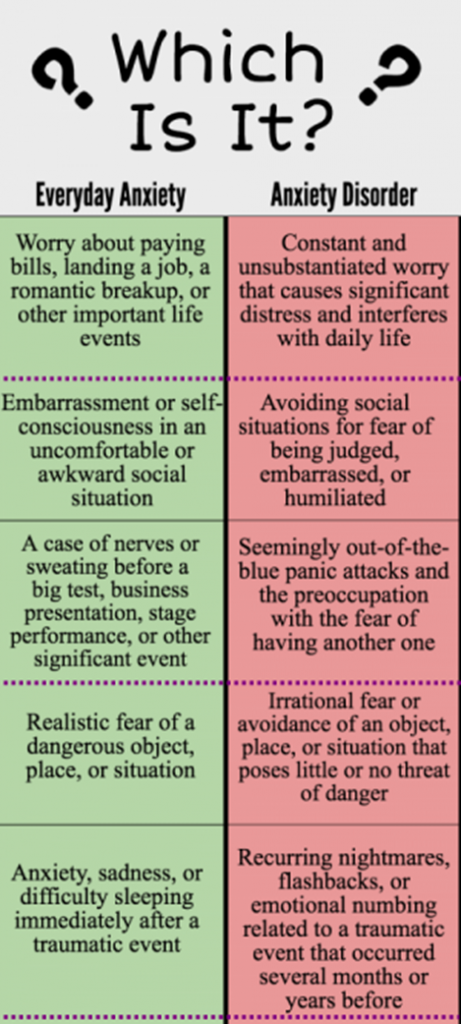We all have some anxiety and worries sometimes. That’s part of the spectrum of normal emotional response, depending on the situation. If your worrying gets to the point that it interferes with your functioning over a period of time on a daily basis, then it could be a cause for concern to address with counseling or some other form of intervention. Counseling may help though, even before your anxiety becomes so severe that you should be given a diagnosis.
(If you’re unsure if you would meet diagnostic criteria, and you’re not sure you can afford counseling on an out of pocket basis, think of it as preventative. One session to discuss your concerns and if you would qualify could reassure you and we could discuss what you can afford and also the risks of waiting.)
Here is some information on some of the common diagnoses and concerns seen and used with counseling clients,
- Stress– stress itself is not a diagnosis, but there are issues that can cause concern and anxiety that you may want to address in counseling before the stress leads to a real mental or physical health concern. Some of the issues that people go to counseling for are job stress, parenting worries, especially when dealing with major illness or disability. Relationship stress is a major reason for counseling
- Anger management is another reason people come for counseling.
- Adjustment Disorders– there are several sub-types and also a nonspecific type. This is one of the most common types of diagnosis I see and use. Generally speaking, it is a fairly benign diagnostic label, even if your symptoms don’t feel so benign. There is usually an identifiable event or series of events causing distress, and once the events or precipitating factors are gone, symptoms generally subside within six months, often even without treatment. For more information about adjustment disorders, click this link: https://www.healthline.com/health/adjustment-disorder
- Anxiety Disorders – as with Adjustment disorders, there are sub-types. Besides generalized anxiety, some common specific types of anxiety are obsessive-compulsive disorder, social anxiety, and separation anxiety (in children). Post traumatic stress and Acute stress reaction are reactions to uncommon situations, but ones that may still be happening too often in society. I have special training and experience in dealing with many types of trauma. But remember, both trauma and anxiety are personal and relative to you, so non reaction or diagnosis should be minimized, nor stigmatized.

For more information about these diagnoses, see these links or additional links listed several places on this website.
https://www.nimh.nih.gov/health/topics/anxiety-disorders/index.shtml
https://adaa.org/understanding-anxiety
- Depression and Mood Disorders – Most people feel down sometimes, but that doesn’t mean they suffer from Clinical Depression, which can be persistent and very serious. However, anyone can suffer from a depressed mood that they have trouble getting out of. Sometimes, it may be caused by a good reason to be sad and sometimes it may be related to something physical or hormonal. Depression can range from mild and occasional to severe in any time frame. Clinical Depression is a type of Mood Disorder, which is a way of saying this topic that someone has trouble regulating their mood within common bounds. Here is a good link for information on this topic:
https://www.familyaware.org/what-is-a-mood-disorder/
There are more resource links about this topic on the “Mental Health Links” page.
- ADD and ADHD – Over the years, this diagnosis has been controversial when it has been suggested by teachers, sometimes for kids who just are slower to mature and have lots of energy. However, it also has been under-diagnosed and/or confused with other learning disabilities. Many adults are realizing later in life that they may have suffered from ADD (Attention Deficit Disorder). Symptoms of distractibility, impulsivity, poor concentration, and poor organizational skills may reflect anxiety, sleep problems, and/or other problems. There are self-tests on line, but because of this, be careful of diagnosing yourself. You can read more about ADD here: https://chadd.org/about/#mission
- Eating Disorders – Most people have heard of anorexia and bulimia. But Binge eating disorder is the most common eating disorder. It is often associated with being overweight or obese, but not necessarily in either direction. Here is a link for more information on Binge Eating Disorder:
https://www.healthline.com/health/eating-disorders/binge-eating-disorder-statistics#1
Obesity is a physical medical problem, but there are associated ramifications both psychologically and physically for both obesity and all kinds of eating disorders.
“A new snapshot of obesity in America paints an alarming picture,” is how a new article from September 16, 2019 starts out (https://www.medscape.com/viewarticle/918442). In addition to the physical stress obesity puts on the body, there are numerous psychological and self-esteem effects. Statistics of prevalence by gender vary, but it affects both men and women, children and adults.
Here are some statistics:
According to data from the National Health and Nutrition Examination Survey (NHANES), 2013–20142,3,4,5
- More than 1 in 3 adults were considered to be overweight.
- More than 2 in 3 adults were considered to be overweight or have obesity.
- More than 1 in 3 adults were considered to have obesity.
- About 1 in 13 adults were considered to have extreme obesity.
- About 1 in 6 children and adolescents ages 2 to 19 were considered to have obesity.
Bias and discrimination against people with weight issues continue to be of concern. Although there has been some backlash against this, the weight loss and weight management industries are big business for many reasons. The majority of people who are overweight would prefer not to be, despite the need to learn to “accept themselves as they are,” which is a message many hear. That is one of many mixed messages causing confusion, stress, guilt, and low self-esteem. Together with the physical consequences of fatigue and higher risk of illness, people who are overweight face endless cycles of weight gain and loss, social isolation, and risk of mental illness.
Here are some links for more information on obesity, bariatric surgery, and eating disorders:
https://asmbs.org/patients/bariatric-surgery-procedures
https://www.obesityaction.org/our-purpose/about-us/story/
https://www.nedc.com.au/eating-disorders/eating-disorders-explained/obesity-and-eating-disorders/

